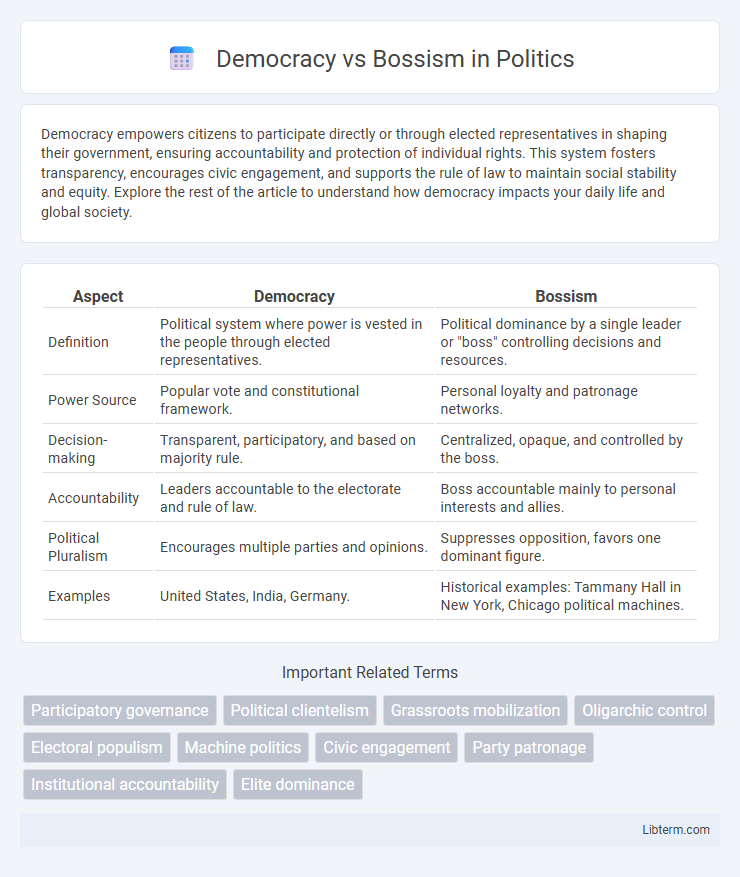Democracy empowers citizens to participate directly or through elected representatives in shaping their government, ensuring accountability and protection of individual rights. This system fosters transparency, encourages civic engagement, and supports the rule of law to maintain social stability and equity. Explore the rest of the article to understand how democracy impacts your daily life and global society.
Table of Comparison
| Aspect | Democracy | Bossism |
|---|---|---|
| Definition | Political system where power is vested in the people through elected representatives. | Political dominance by a single leader or "boss" controlling decisions and resources. |
| Power Source | Popular vote and constitutional framework. | Personal loyalty and patronage networks. |
| Decision-making | Transparent, participatory, and based on majority rule. | Centralized, opaque, and controlled by the boss. |
| Accountability | Leaders accountable to the electorate and rule of law. | Boss accountable mainly to personal interests and allies. |
| Political Pluralism | Encourages multiple parties and opinions. | Suppresses opposition, favors one dominant figure. |
| Examples | United States, India, Germany. | Historical examples: Tammany Hall in New York, Chicago political machines. |
Understanding Democracy: Core Principles
Democracy is founded on core principles such as popular sovereignty, political equality, and the protection of individual rights, ensuring that the authority of government derives from the consent of the governed. It promotes transparency, accountability, and the rule of law, enabling citizens to participate meaningfully in decision-making processes through regular, free, and fair elections. Contrasting with bossism, democracy emphasizes decentralized power and institutional checks that prevent the concentration of authority in the hands of a single leader or political boss.
What is Bossism? Defining the Concept
Bossism refers to a political system where a single leader or small group, known as the "boss," exercises substantial control over a political party or local government, often relying on patronage, favoritism, and centralized authority. Unlike democratic governance, which emphasizes broad participation, transparency, and accountability, bossism thrives on hierarchical power structures and personal loyalty networks. This concept highlights challenges to democratic principles, including reduced citizen influence and increased potential for corruption and political manipulation.
Historical Roots of Democracy and Bossism
Democracy traces its historical roots to ancient Athens in the 5th century BCE, where the concept of citizen participation and voting laid the foundation for modern representative government. Bossism emerged in the late 19th and early 20th centuries within urban political machines in the United States, characterized by powerful leaders, or bosses, who controlled elections and dispensed patronage to maintain authority. While democracy emphasizes equal political participation and accountability, bossism historically exploited social networks and political corruption to dominate local governance.
Key Differences Between Democracy and Bossism
Democracy relies on free and fair elections, allowing citizens to participate equally in decision-making processes, whereas bossism centers on a powerful political boss who controls votes and decisions through patronage and intimidation. In democratic systems, transparency and accountability are fundamental, contrasting with bossism where power is concentrated in the hands of a single leader often operating behind the scenes. The legitimacy of governance in democracy stems from the collective will of the people, while bossism depends on maintaining political dominance through coercive control and personalized loyalty.
Political Power: Distributed vs. Centralized
Democracy emphasizes distributed political power, enabling citizens to participate equally in decision-making processes through elected representatives and institutional checks and balances. Bossism, in contrast, centralizes political power in the hands of a single authority or political boss who controls resources and voter mobilization to maintain dominance. This concentration limits democratic accountability and often leads to authoritarian governance structures.
Decision-Making Processes in Both Systems
Democracy emphasizes participatory decision-making, where power is distributed among elected representatives and citizens engage through voting, public debate, and transparency mechanisms. Bossism centralizes decision-making authority in a single leader or small group, often prioritizing loyalty and control over collective input or accountability. The democratic process fosters inclusive policy development and checks on authority, contrasting with bossism's streamlined but potentially autocratic governance.
Impact on Civil Liberties and Rights
Democracy fosters the protection and expansion of civil liberties and individual rights through institutional checks and participatory governance, ensuring accountability and transparency. In contrast, bossism often undermines these freedoms by concentrating power in the hands of a few authoritative figures who suppress dissent and restrict civil rights to maintain control. The erosion of press freedom, curtailment of free speech, and limited political participation are common consequences in bossist systems, impacting the overall quality of democracy and society.
Governance Outcomes: Accountability and Transparency
Democracy promotes governance outcomes characterized by higher accountability and transparency through institutional checks such as free elections, independent judiciary, and a free press that monitor government actions. Bossism, often marked by centralized authority and personalistic rule, tends to reduce these governance standards by limiting oversight and fostering opaque decision-making processes. Empirical studies show democratic regimes generally achieve better public service delivery and lower corruption levels compared to bossist systems.
Case Studies: Countries Exemplifying Each System
India exemplifies democracy with its robust multi-party system, free elections, and judiciary independence, fostering accountability and citizen participation. The Philippines showcases bossism through political dynasties controlling local and national power, often undermining democratic institutions and perpetuating patronage networks. Brazil presents a mixed case where democratic frameworks exist alongside influential regional bosses, highlighting the tension between institutional democracy and personalized political power.
The Future of Governance: Challenges and Opportunities
Democracy faces challenges such as voter disengagement and political polarization, whereas bossism risks authoritarianism and lack of accountability in governance. Emerging technologies and civic participation platforms offer opportunities to enhance transparency, citizen engagement, and policy responsiveness in democratic systems. Balancing these innovations while safeguarding democratic principles is crucial for the future of effective and inclusive governance.
Democracy Infographic

 libterm.com
libterm.com